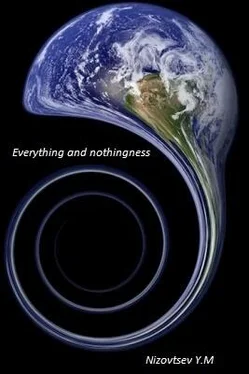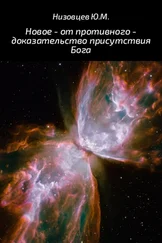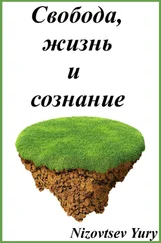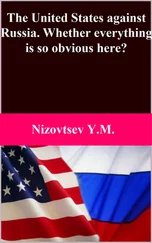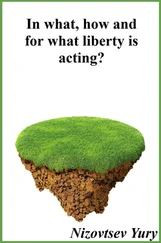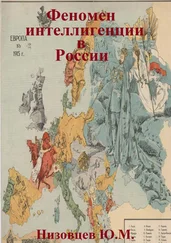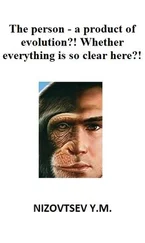Юрий Низовцев - Everything and nothingness
Здесь есть возможность читать онлайн «Юрий Низовцев - Everything and nothingness» — ознакомительный отрывок электронной книги совершенно бесплатно, а после прочтения отрывка купить полную версию. В некоторых случаях можно слушать аудио, скачать через торрент в формате fb2 и присутствует краткое содержание. Издательство: Array SelfPub.ru, Жанр: Философия, История, История, История, beginning_authors, Философия, Биология, Химия, Математика, Физика, Религиозная литература, Религиозная литература, на русском языке. Описание произведения, (предисловие) а так же отзывы посетителей доступны на портале библиотеки ЛибКат.
- Название:Everything and nothingness
- Автор:
- Издательство:Array SelfPub.ru
- Жанр:
- Год:неизвестен
- ISBN:нет данных
- Рейтинг книги:5 / 5. Голосов: 1
-
Избранное:Добавить в избранное
- Отзывы:
-
Ваша оценка:
- 100
- 1
- 2
- 3
- 4
- 5
Everything and nothingness: краткое содержание, описание и аннотация
Предлагаем к чтению аннотацию, описание, краткое содержание или предисловие (зависит от того, что написал сам автор книги «Everything and nothingness»). Если вы не нашли необходимую информацию о книге — напишите в комментариях, мы постараемся отыскать её.
Everything and nothingness — читать онлайн ознакомительный отрывок
Ниже представлен текст книги, разбитый по страницам. Система сохранения места последней прочитанной страницы, позволяет с удобством читать онлайн бесплатно книгу «Everything and nothingness», без необходимости каждый раз заново искать на чём Вы остановились. Поставьте закладку, и сможете в любой момент перейти на страницу, на которой закончили чтение.
Интервал:
Закладка:
Thus, if sense organs and a certain reflective-instinctive mind of the living beings without self-consciousness develops only during evolution, at the person they is supplemented with various instruments of labor, devices, apparatus as well as thinking with elements of analytical and synthetic intellectual actions, imagination, communication language, extensive and databases, replenished all the time, aspirations to new etc., that allows him to create culture, a civilization, to carry out practical incessant process of knowing the world, as well as to improve conditions of own existence; as Heidegger spoke, the person "takes care" of beingness, without forgetting about himself: “The multiplicity of these is indicated by the following examples: having to do with something, producing something, attending to something and looking after it, making use of something, giving something up and letting it go, undertaking, accomplishing, evincing, interrogating, considering, discussing, determining… All these ways of Being-in have concern as their kind of Being – a kind of Being which we have yet to characterize in detail. Leaving undone, neglecting, renouncing, taking a rest – these too are ways of concern; but these are all deficient modes, in which the possibilities of concern are kept to a “bare minimum”. The term “concern” has, in the first instance, its colloquial [vorwissenschaftliche] signification, and can mean to carry out something, to get it done [erledigen], to “straighten it out”. It can also mean to “provide oneself with something”. We use the expression with still another characteristic turn of phrase when we say “I am concerned for the success of the undertaking.” Here “concern” means something like apprehensiveness. In contrast to these colloquial ontical significations, the expression “concern” will be used in the investigation as an ontological term for an existentiale, and will designate the Being of a possible way of Being-in-the world. This term has been chosen not because Dasein happens to be proximally and to a large extent “practical” and economic, but because the Being of Dasein itself is to be made visible as care” [4, p. 83-84].
Thereby awareness by the person of himself gives him opportunity in the course of the practical actions and the subsequent reflection (and vice versa) to find essence, stability of things in their changes, but it happens only on the basis of what the person feels without opportunity to penetrate into the world, which is felt by other living beings, as well as without opportunity to penetrate beyond their own sensations, even expanded with devices, in particular, to get into own hidden consciousness (the subconscious mind), distant worlds, other measurements.
Therefore argument of materialists, including V. I. Lenin, that practice is the only criterion of truth during knowledge of objectively existing things that is everything that exists outside sensations (this ultraboundary Lenin V. I. calls matter) which connect consciousness of the person with the outside world, may not be adequate. This criterion is valid, as we have shown above, only applied to the current life, but not for the entire multifaceted beingness, and, in particular, to prove the presence of things in such form how we perceive them, or lack of things outside sensations is impossible with all certainty.
In this regard, neither materialists, represented by V. I. Lenin in his assertion about the existence of matter as primary and not depending of sensations, nor empirio-critics, represented by Avenarius and Mach, which asserted the primacy and somewhere the uniqueness of sensations, can't apply for the ultimate truth, so how don't represent adequate ratio of beingness, consciousness and information.
However, Avenarius and Mach in his approach to the ratio of sensations and things in some respects moved further Berkeley and Husserl and further the materialists, having presented certain evidence of its concept, in which consciousness becomes attached to things, and vice versa, things do not exist outside consciousness.
At this materialist arguments in the face of Lenin, as you can see, often look unconvincing, though sensation, thought really “… is the supreme product of matter organized in a particular way” [1, chapter 1.2], which Lenin, however, did not give any interpretation.
Lenin was right, that “.... sensation is indeed the direct connection between consciousness and the external world” [1, chapter 1.1]; but in the opposite sense, because the outside world as a holographic projection Uniform is formed directly by the single consciousness; besides, sense organs of each conscious being (the live) are connected with Uniform, on the basis of which the single consciousness is copying every "moment" things for updating of former copies of things from Uniform by means of their identification through sense organs of conscious beings and thanks to understanding by the single consciousness of forms of these things.
Whatever it was, Avenarius and Mach are right in the respect that without consciousness there is no matter and vice versa, though here they exhibit significant fluctuations, then reducing matter to sensations, then claiming that matter as some substance still exists.
In particular, Mach reduces matter to sensations, indicating on this in the following fragment: “Sensations are not “symbols of things”. The “thing” is rather a mental symbol for a complex of sensations of relative stability. Not things (bodies) but colours, sounds, pressures, spaces, times (what we usually call sensations) are the real elements of the world” [15, p. 473].
At the same time Avenarius believes that each person is a sensing substance, i.e. he recognizes existence along with sensations (consciousness) of some matter though accurately doesn't share them: "So as … neither the experience nor the right conclusions from it do not give the right to consider sensations as a result of motion, it is appropriate to recognize sensations as a property of the respective substance and therefore to allow the existence of sentient substances. At this is especially valuable for us the fact that we know ourselves as the sensing substance and in our inner experience sensation is given with more certainty than is substantiality" [3, §91].
But not everything is exactly as believe Mach and Avenarius because on the basis presented by them it is impossible to draw conclusion on absence in general for the person of the objective reality, more precisely, to draw a conclusion on lack of things, which are independent of consciousness, for the following reasons.
In infinite and eternal Uniform consciousness (the active) and things (the passive) are merged together, and in a different way out of time can't be, and it isn't necessary to speak here about dependence or independence of things from consciousness.
But timeless Uniform as the infinite which remains invariable, is manifested through own holographic projection which exists in time, and three-dimensional measurement as a derivative from it the person can observe. And this changeable reality round the person is quite independent of him so how he isn't capable to change motion of stars and even weather on Earth.
Therefore, Avenarius and Mach are wrong in their denial of the existence of objective reality for the human, or more precisely, – denial of independently existing from human things, essentially bearing in mind only something with which one is confronted in its activity, pointing to the inseparability of subject and object in the experiment.
But even in this field things and the person are clearly separated from each other, although Avenarius believes otherwise: "… two component parts are inseparably fused in a primitive experience: first, what by its content is given indeed through the subject; secondly, what one who cognizes, perhaps, himself has introduced into the subject of experience"[3, §49].
Читать дальшеИнтервал:
Закладка:
Похожие книги на «Everything and nothingness»
Представляем Вашему вниманию похожие книги на «Everything and nothingness» списком для выбора. Мы отобрали схожую по названию и смыслу литературу в надежде предоставить читателям больше вариантов отыскать новые, интересные, ещё непрочитанные произведения.
Обсуждение, отзывы о книге «Everything and nothingness» и просто собственные мнения читателей. Оставьте ваши комментарии, напишите, что Вы думаете о произведении, его смысле или главных героях. Укажите что конкретно понравилось, а что нет, и почему Вы так считаете.
